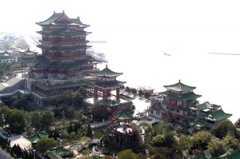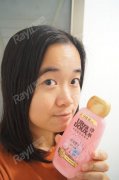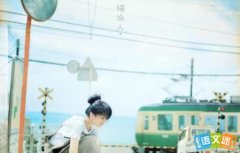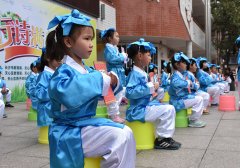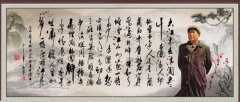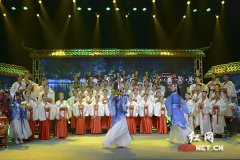诗歌翻译:王勃·《滕王阁序》英文译文(3)
Ah! A beautiful scenic spot is rarely seen, and a sumptuous banquetlike this one is even less likely to be held again. The grand gathering at theOrchid Pavilion (33) is an event in history and the famous Jinggu Garden (34)is now in ruins. I have the good fortune to attend this feast and I would liketo leave this farewell message at the time of paring. I count on all thegentlemen here to ascend the tower and contribute their writings. I humblycompose this short piece in all sincerity. Since every one of us is required towrite a poem, the following is what I write:
The lofty King Teng’s Tower Overlooks the River.
The jade pendants (35) tinkle, andthe carriage bells jingle.
The banquet’s over, the guests are leaving, andthe singing and the dancing have stopped.
In the morn the rosy clouds fromthe southern shore flit across the painted pillars.
In the eve the rain in the westernmountains are drawn in by the red curtains.
The lazy clouds are reflected inthe water and the days pass in leisure.
Things change and stars move; howmany years have passed since the building of the Tower?
Where is its builder, King Teng?
Only the River outside the railingflows to the east all by itself.
(1)In old times the sky was divided into 28 constellations, and eachconstellation had influence on a certain area on the earth. Nanchang was underthe influence of the Ye and the Zhen constellations.
(2)The Heng Mountain is located to the southwest of Nanchang and theLu Mountain to its north.
(3)The three rivers are the Jing, the Song, and the Zhe rivers.
(4)In old times there was a piece of cloth in the upper part of along gown, with which people used to wrap things.
(5)The five lakes are the Tai, the Poyang, the Qingcao, the Danyang,and the Dongting lakes.
(6)The Jing area was the Chu area prior to the Qin Dynasty. It wasless developed than the rest of the country.
(7)It now mainly refers to Zhejiang Province.
(8)The name of a kingdom during the Zhou Dynasty (1046B.C.- 256B.C.) , mainly referring to the east of Zhejiang Province, Jiangsu Province,and part of Anhui Province.
(9)It was said that during the Jin Dynasty, there appeared a purplevapor between the Niu and the Dou constellations. Later people discovered aprecious sword in Hongzhou.
(10)Xu Ru was a poor scholar in the Eastern Han Dynasty. Despitepoverty, he declined to be a government official. When Chen Fan was the prefectof Yuzhang County, he received no guests except Xu Ru, for whom a bed wasalways prepared in his home.
(11)It refers to Yuwen Jun, who was newly appointed as prefect ofLizhou.
(12)It refers to King Teng’s Power.
(13)Prince of Xiao of the Liang State of the Western Han Dynastyoften entertained scholars in the bamboo garden by the Sui River.
(14)Tao Yuanming was the author of “A Tale of the Fountain of thePeach Blossom Spring”.
(15)Cao Cao and his son Cao Zhi often entertained guests by RiverYe. Cao Zhi had written a poem in praise of the lotus flowers.
(16)Xie Lingyun was an official in Linchuan Prefecture, JiangxiProvince. Another interpretation is that Wang Xizhi is referred to here,because he was also an official in Linchuan.
(17)Wuhui is today’s City of Suzhou in Jiangsu Province.
(18)During the reign of Emperor Wen of the Han Dynasty, Jia Yi wasexiled to Changsha and was called back to the court four years later.
(19)Feng Tang was an official of a low rank in the Han Dynasty.During the reign of Emperor Wu, he was recommended to a high-ranking official.But it was too late, as he was already over ninety and could no longer servethe emperor.
(20)Li Guang, a military man during the reign of Emperor Wu of theHan Dynasty. He had performed many military exploits but had never been fullyrewarded.
(21)Liang Hong was a scholar during the Eastern Han Dynasty. Hewrote a satirical song to criticize the noblemen and offended the emperor. Hehad to escape to the Qi and the Lu areas, which were near the sea.
(22)It was believed that on the outskirts of Guangzhou there was theSpring of Avarice. People became avaricious after drinking its water.
(23)Meng Chang was an upright official during the Eastern HanDynasty, but he never got a high position.
(24)Ruan Ji was a scholar in the Wei and the Jin dynasties. He wasangry with the rotten politics of his time and often went out in his carriage.When the road was blocked, he would cry and turn back.
(25)Zhong Jun was a young man living in the Western Han Dynasty. Hemade up his mind to capture the king of the enemy when he was about twentyyears of age.
(26)Ban Chao was a scribe during the Eastern Han Dynasty. He laterperformed military exploits and was rewarded.
(27)Zong Que was a young man during the Southern Dynasty (420-589).When asked what he would do in the future, he answered that he would go to thefront and “brave the wind and waves”. Later he became a general.
(28)Xie Xuan, a young man during the Eastern Jin Dynasty. His unclepraised him as “the treasure tree of the Xie family.”
(29)Kong Li was the son of Confucius.



